What a difference a summer makes.
Five months ago, the Blues were sputtering to the end of their season, losing five of their final six games to miss the playoffs by just one point. Fans were disgusted with their team and their general manager, certain that they were headed towards another offseason with minor tweaks instead of major changes.
Flash forward one month: the Blues are declared the winners of the offseason by ESPN’s Greg Wyshynski. Though they lost out on the John Tavares sweepstakes, the Blues made a bevy of moves that overhauled their roster in significant ways. Add to that a farm system that is consistently ranked in the top five in the league, and the Blues are once again poised to be a significant competitor for many years to come.
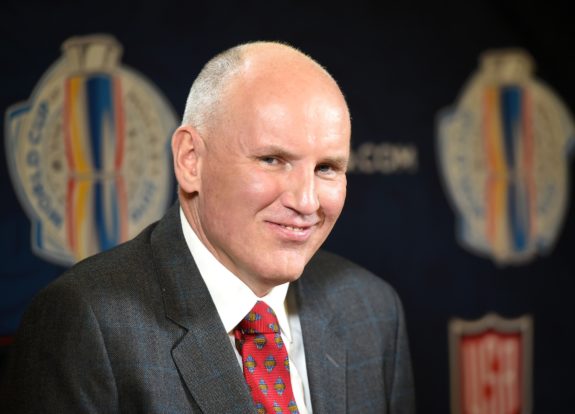
Blues’ fans are now chomping at the bit to get the season started, because there are still many questions to answer: will new star center Ryan O’Reilly find chemistry with Vladimir Tarasenko? Where will prospects like Robert Thomas and Jordan Kyrou end up? How will Jake Allen stand up to the rigors of another season?
The Blues need to answer these questions and many more this season, and they must find themselves in a playoff position at year’s end. But the moves they’ve made make them look like a legitimate contender in 2018-19.
2017-18 Record: 44-32-6, 94 points (5th in Central Division, 9th in Western Conference, 17th in NHL standings)
Offseason Moves
Key Roster Additions:
- Tyler Bozak
- Chad Johnson
- Patrick Maroon
- David Perron
- Ryan O’Reilly
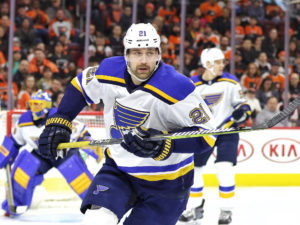
Key Roster Losses:
- Patrik Berglund
- Kyle Brodziak
- Carter Hutton
- Vladimir Sobotka
- Paul Stastny (at trade deadline)
- Tage Thompson
- Scottie Upshall
2018 NHL Entry Draft:
- Dominik Bokk (1st round, 25th overall)
- Scott Perunovich (2nd round, 45th overall)
- Joel Hofer (4th round, 107th overall)
- Hugh McGing (5th round, 138th overall)
- Matthias LaFerriere (6th round, 169th overall)
- Tyler Tucker (7th round, 200th overall)
Organizational Changes
Other than Ken Hitchcock’s firing a year and a half ago, the Blues’ organization has remained remarkably consistent in the Doug Armstrong era. Mike Yeo remains as head coach, despite his struggles on the power play. Darryl Sydor stepped down as an assistant coach, but was replaced by former Blue Mike Van Ryn.
The biggest single change organizationally is the partnership the Blues have established with the San Antonio Rampage of the AHL. With the expansion last season, the Blues were the odd man out in having a steady AHL partnership, an error which negatively affected many of their prospects. Now, the Blues have their farm system in order again, and have installed Drew Bannister, OHL coach of the year, as the head coach in San Antonio.
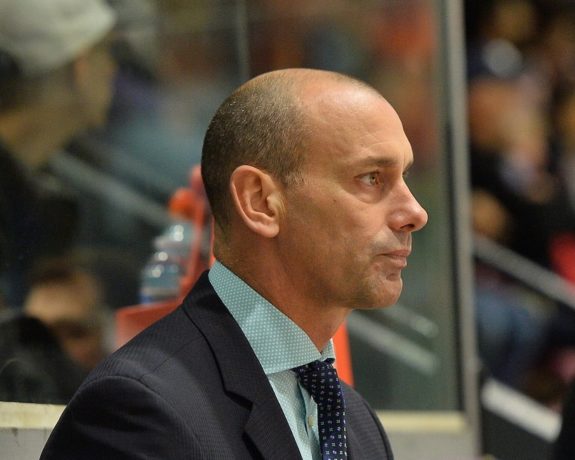
In the front office, Martin Brodeur’s tenure in the Blues organization came to an end rather suddenly. Brodeur returned to the franchise with which he is synonymous, the New Jersey Devils, in order to spend more time with his family. Taking his place as assistant GM will be Bill Armstrong, who will maintain his title as Scouting Director. It’s a much-deserved promotion for Armstrong, who would have been an appealing target for other franchises had the Blues not moved him up in their own.
With Doug Armstrong signed to a four-year extension last season, and given the ensuing success of the Blues’ offseason, it will be Yeo who starts the year under the microscope. He’s not exactly in the hot seat, but if the redesigned Blues can’t find traction, particularly on the power play, you can expect to hear much of the St. Louis fan base’s discontent directed at Yeo.
Forwards
Projected Lines
Patrick Maroon — Ryan O’Reilly — Vladimir Tarasenko
Jaden Schwartz — Brayden Schenn — David Perron
Robby Fabbri — Tyler Bozak — Alex Steen
Ivan Barbashev — Robert Thomas — Dmitrij Jaskin
Ryan O’Reilly
The biggest acquisition of the offseason came when the Blues traded a haul of roster players, picks, and prospect Tage Thompson in exchange for Ryan O’Reilly. O’Reilly was the final piece in an overhaul of the Blues’ center core that included trading for Brayden Schenn at the 2017 draft, trading Paul Stastny, signing Tyler Bozak, and drafting Robert Thomas.
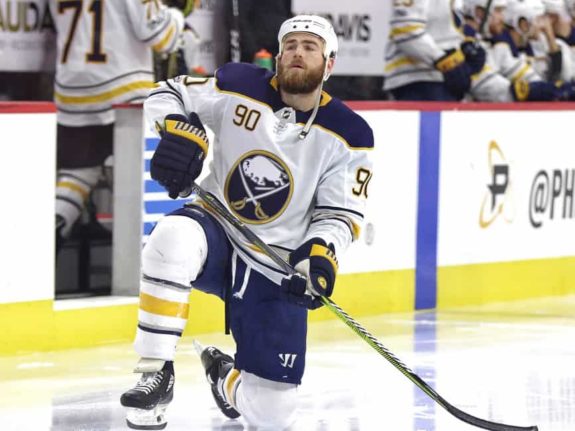
The time was right for the Sabres to part ways with O’Reilly, particularly after he opened up about his struggle with the culture in Buffalo in some controversial comments at the end of the year. Now the Blues hope O’Reilly will recapture his love of the game playing in St. Louis, and find chemistry with star winger Vladimir Tarasenko. If he has the kind of breakout year that Schenn did last year after joining the Blues, St. Louis will find itself with one of the strongest center cores in the league very quickly.
Robby Fabbri
Robby Fabbri is expected to return this season after missing a season and a half with consecutive knee injuries. Before his first injury, he was one of the Blues’ young stars, posting 18 goals and 37 points as a rookie and was on pace for a 46-point season before his injury. But two consecutive injuries can take a serious toll on the body, not to mention the damage it could do to a young player’s confidence.
As such, Fabbri is perhaps the biggest wild card on the Blues’ roster. If he is somehow able to recapture the momentum he had a year and a half ago, he will be an incredible addition to the Blues’ forward group and round out one of the more formidable top-9’s in the Western Conference. If Fabbri cannot perform at that level, it may open up an opportunity for one of the Blues’ prospects, like Jordan Kyrou or Sammy Blais, to earn regular playing time.
Patrick Maroon
The final big move of the Blues’ offseason was signing hometown kid Patrick Maroon to an outrageously team-friendly, one-year, $1.75 million contract. Maroon, who turned down bigger and longer-term offers from other teams, expressed his excitement about coming home in a tweet, saying, “Excitement is an understatement! Can’t wait to join the @StLouisBlues, this is a dream come true!!”
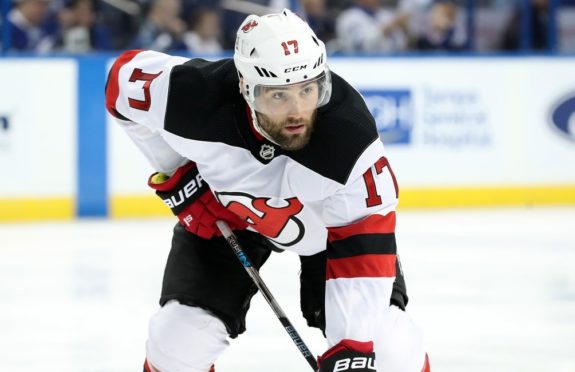
Maroon, affectionately known as “The Big Rig,” will bring much-needed size and grit to a Blues roster that has been without it since losing David Backes and Troy Brouwer two years ago. There’s no telling what impact Maroon might have, but the story of the local boy playing for the hometown team will be one to watch all season.
The Fourth Line
One of the areas of least certainty on the Blues’ roster is their fourth line. Longtime fourth line stalwarts like Kyle Brodziak, Scottie Upshall, and Ryan Reaves have left, leaving a completely new group to take on their energizing role. More and more it seems like the fourth line will also be home for Blues’ top prospect Robert Thomas entering the season.
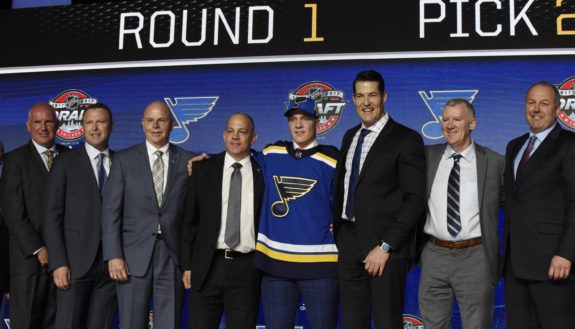
Whether Thomas stays on the fourth line long term depends on how quickly he adjusts to the NHL game, as well as where other needs open up. Entering the season, Thomas will likely play with Dmitrij Jaskin consistently, while the other wing will be manned by a rotation of several different players that could include Chris Thorburn, Oskar Sundqvist, and Ivan Barbashev. Nikita Soshnikov, who figured to be a part of the fourth line group, is already on the shelf with a concussion, one of many in his career.
Defense
Projected Pairings
Joel Edmundson — Alex Pietrangelo
Vince Dunn — Colton Parayko
Jay Bouwmeester — Carl Gunnarsson
Vince Dunn
Vince Dunn surprised a lot of people, including many Blues’ fans, with his breakout season last year. He averaged over 17 minutes per game and finished with 24 points in 75 games. Later in the season, Dunn was paired more regularly with Colton Parayko, a potent pairing of two-way defensemen that can produce points at a high rate.
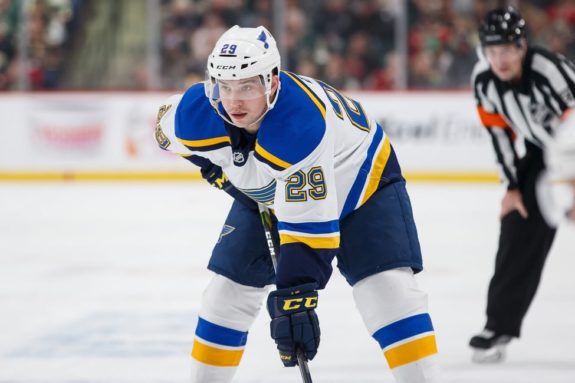
Dunn’s primary goal this season will be avoiding the notorious “sophomore slump”. If he can, he is poised to play 18-22 minutes per game and could evolve into the quarterback of one of the power-play units. He has that level of speed, hockey-IQ, and puck-moving skill. If Dunn slumps, the Blues have lots of defenders who can pick up some of the slack; however, no one behind him offers the overall upside that Dunn’s game presents.
The Third Pairing
As it stands, the Blues’ third pairing seems most likely to be the partnership of Gunnarsson and Bouwmeester, if both are healthy to start the season. It will be a strange transition year for the Blues, with both players being on the final year of their contract and likely heading elsewhere after the season.
This pairing could go one of two ways. At its best, the two veterans will be helped by the limited minutes they’ll receive in a third pairing role and evolve into a steady, experienced partnership that could put out fires. At worst, Bouwmeester and Gunnarsson will show the rust that long careers and recent injuries have put on them, and will be a real weakness for the team.
In the worst-case scenario, the Blues do have options. Robert Bortuzzo remains with the team and is a steady hand that the Blues are willing to deploy up and down the lineup. Behind him, the team has several prospects, including Jordan Schmaltz (who recently signed a two-year extension), Jake Walman, and Niko Mikkola. Each provides a different set of skills that could help but as long as Bouwmeester and Gunnarsson are healthy, their contracts will likely earn them the first shot at playing time on the third pairing.
Goaltending
The team’s Achilles’ heel is goaltending. Jake Allen was inconsistent at best last season, and now sits as the unquestioned number one with the departure of Carter Hutton. Allen had a great month of October and was all right through December, but struggled mightily in January, where he posted an .871 save percentage and a 4.93 goals-against average in just three games, and in February where he collected an .877 SV% and a 3.32 GAA in eight games.
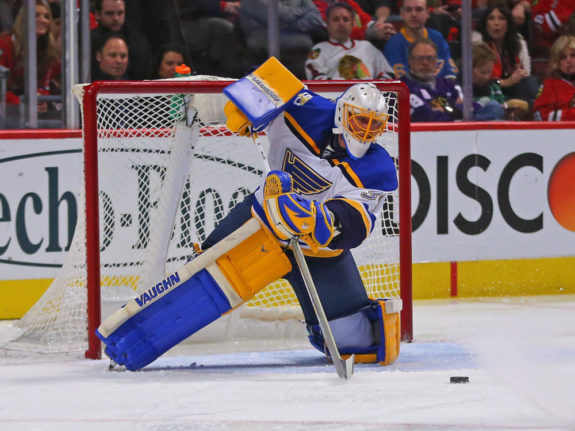
Last year, Allen was buoyed by the exceptional play of backup Hutton. But Hutton has moved to a bigger role in Buffalo, while the Blues have signed erstwhile Sabres backup Chad Johnson. As Johnson’s numbers last season weren’t much better than Allen’s at his worst, the onus is on Allen to hold down the net this year. If he’s again inconsistent, the Blues’ offseason moves may be for nought.
Behind Johnson looms Blues’ top goaltending prospect Ville Husso. Husso had a tremendous season in the AHL last year, even being named to the AHL All-Rookie Team. But the Finnish goaltender is only 23, and he would benefit from another year of seasoning. It’s tough to say how he’d respond if thrust into a significant NHL role, but it’s probable that the Blues’ front office would rather not find out.
Prospect Watch: Thomas, Kyrou, and More
One of the potential X-factors of the season is what impact if any, the Blues’ top prospects will have. Thomas and Kyrou are both consistently ranked in the top-3o NHL prospects and their styles offer very different things to the roster. Thomas offers the Hockey-IQ and playmaking ability that could make him the number one center the Blues have sought for many years, while Kyrou has the elite speed and shooting acumen that could make him almost as big a scoring threat as Tarsenko.
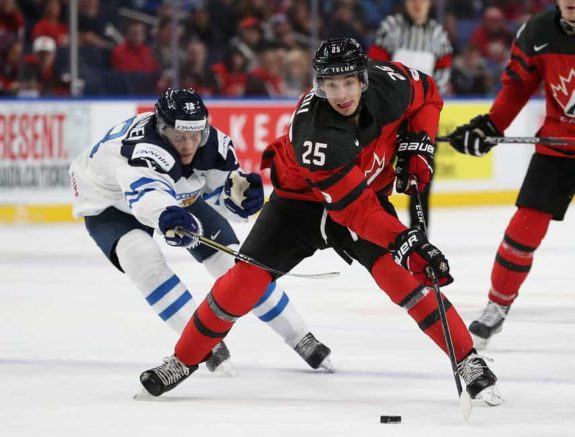
Behind Kyrou and Thomas are a number of prospects that could make an impact in the near future. Higher-rated prospects like Klim Kostin and Dominik Bokk are probably farther off, but behind them are players like Sammy Blais, Erik Foley, and Nolan Stevens who are more experienced and ready to fill roles in the NHL. While none of them necessarily have futures as top-6 superstars, any of them could play some role in the bottom six as soon as this season.
The Blues’ depth is an incredible turnaround from last year when a rash of preseason injuries had Blues’ brass scrambling for external solutions. Now, when the team suffers injuries, they’ll have any number of young players who can step in to fill the void. Whether those players can fill their skates remains to be seen, but the Blues have no shortage of options and that’s a significant improvement from years past.
What to Expect
Few teams look as different today from last season’s roster as do the Blues. New arrivals like Maroon, Bozak, Perron, and O’Reilly have revitalized the top-9, while a number of prospects are waiting in the wings to make an impact. As Allen said in a press conference recently, “It’s a great time to be a Blue.”
"It's a great time to be a Blue, to be honest." – @34jallen #stlblues pic.twitter.com/KKMqfVPo91
— St. Louis Blues (@StLouisBlues) September 15, 2018
Whether it remains fun to be a Blue rests largely on Allen’s shoulders. His inconsistency last year was perhaps the primary reason the Blues missed the playoffs by only one point and now he doesn’t have Hutton to bail him out. If Allen can be the phenomenal goalie he’s been in the past, as he was when he single-handedly carried the Blues through the first round of the playoffs in 2016, it’s shaping up to be an incredible year. But if the Blues fall short, it will likely be because Allen has struggled again.
On defense, the Blues have one of the most impressive young groups of four in the league, led by captain Alex Pietrangelo. Whether the third pairing is staffed by aging veterans or young upstarts, defense should be a strength for the team again.
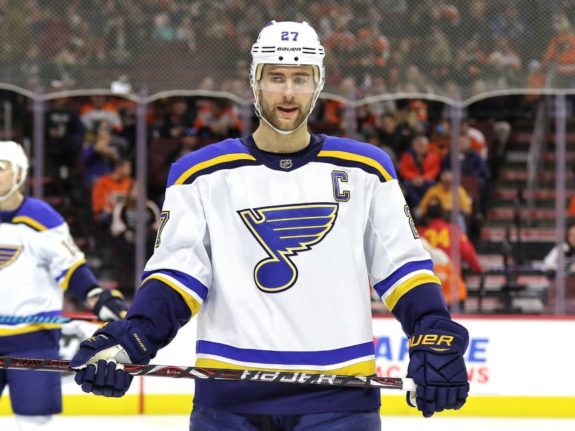
Up front, there are endless combinations of linemates for Yeo to play with. The Blues may face some of the challenges that overhauled teams often face early in the year, starting slow as the forwards try to build chemistry. But if the lines can find that chemistry, there’s no reason the forwards can’t compete with the best groups in the West.
The Bottom Line: Playoffs or Bust
Quite simply, the Blues must return to the playoffs in 2019. With the amount of work Armstrong has done to redefine his roster, there is no excuse for the team to struggle to make the postseason, even in a loaded Western Conference.
While we can’t see the future, the most likely culprits if the Blues miss out on playoff hockey are Allen and Johnson. The pressure will be on Allen from the drop of the puck on opening night to prove that he is the kind of goalie who can carry the workload of a true number one. If Johnson is called upon, he needs to prove that he can be a suitable backup.
If the Blues miss the playoffs, there’s no telling what will happen but it likely won’t bode well for Allen and could mean the end of Yeo’s tenure as well.
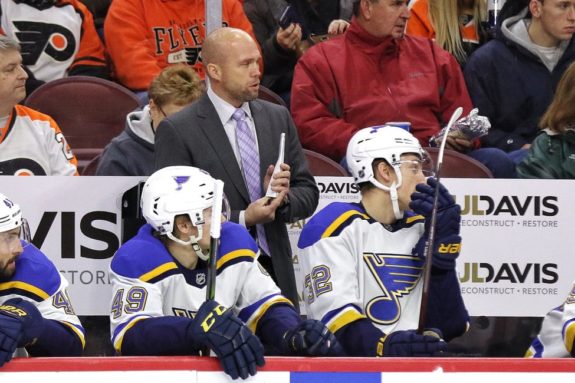
But Blues’ fans have no reason to be pessimistic. They are entitled to their excitement and should expect playoff hockey to return to St. Louis. While the roster may not quite measure up to the Nashville Predators, the Winnipeg Jets, and the newly reinforced San Jose Sharks, they should be at the top of the next class of Western Conference teams and are poised to grow into a perennial contender once again.